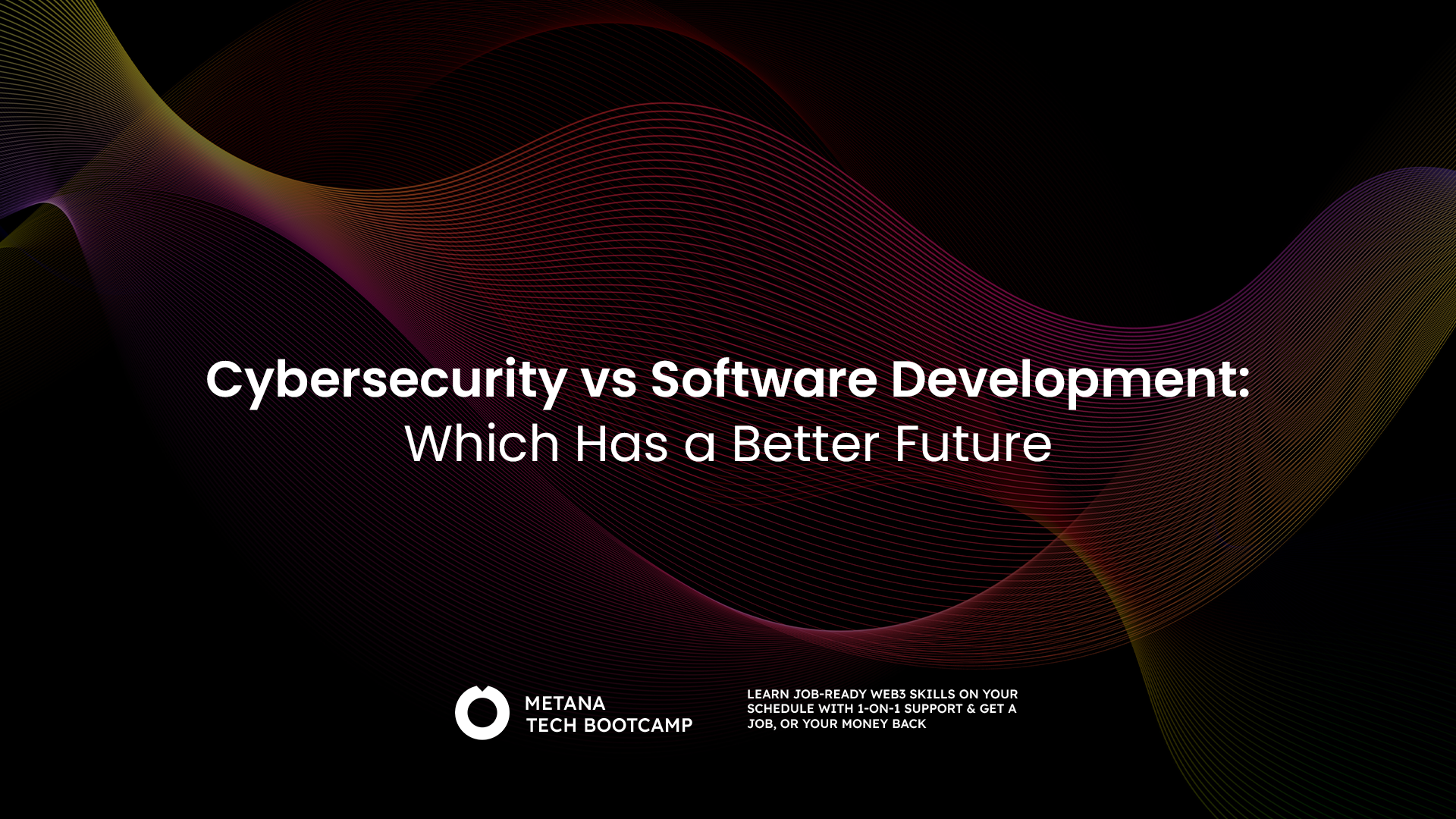TL;DR:
- Cybersecurity focuses on protecting systems and data from threats, while software development involves creating and maintaining applications.
- Both fields offer attractive salaries and growth potential, with cybersecurity seeing rapid demand due to increasing cyber threats.
- Cybersecurity requires skills in networking, ethical hacking, and risk management; software development emphasizes programming and problem-solving.
- Work environments differ: cybersecurity often involves reactive, high-pressure situations, whereas software development is typically project-based with set deadlines.
- Choosing between the two depends on individual interests in security and risk management versus creativity and coding.
In this era of continuous technological advancement, choosing the right career path can feel overwhelming. If you are having an hard time figuring out the career outlook for cybersecurity vs software development, you’re in the right place to gain clarity and insight.
Both fields offer immense growth potential, attractive salaries, and opportunities to shape the future of technology. However, they differ in focus, required skills, and career prospects. This article provides a comprehensive comparison of the career outlook for cybersecurity vs software development, helping you make an informed decision about your professional future.
Understanding Cybersecurity and Software Development
Before diving deep into the differences between these two fields, let’s first try to build a clear understanding of what each field encompasses and the responsibilities of professionals within them.
Cybersecurity

Cybersecurity involves protecting computer systems, networks, and data from cyber threats such as hacking, malware, and phishing.
A cybersecurity expert is primarily responsible for safeguarding an organization’s digital assets from potential cyber threats. Their day-to-day duties include monitoring networks for suspicious activity, investigating breaches, and implementing security protocols to prevent attacks. They conduct vulnerability assessments, deploy firewalls, and manage intrusion detection systems to protect sensitive information.
Cybersecurity experts often work closely with other IT departments to make sure all systems adhere to security standards. Additionally, they educate employees on best practices to minimize risks, such as phishing or malware attacks. Their skills and knowledge is important in designing incident response plans, enabling organizations to act swiftly in case of a security breach.
Software Development

Software development is the process of designing, coding, testing, and maintaining applications or systems to meet specific user needs. It encompasses everything from creating mobile apps to building large-scale enterprise solutions.
A software engineering expert focuses on designing, developing, and maintaining software applications and systems. They analyze user requirements and transform them into efficient and scalable code. Their responsibilities include creating prototypes, writing clean and optimized code, and testing software to identify bugs or inefficiencies.
Software engineers often collaborate with cross-functional teams, including designers and project managers, to make sure the final product meets user needs and business goals. Beyond coding, they document processes, update existing systems, and integrate emerging technologies to improve performance.
Cybersecurity vs Software Development: What’s the Difference ?
Now that we have a clear understanding of both fields and the roles of professionals within them, let’s explore what has contributed to the overlap and blurred distinctions between the two.
| Cybersecurity | Software Development | |
|---|---|---|
| Main Focus | Protecting systems, networks, and data from cyber threats. | Designing, developing, and maintaining software applications. |
| Core Activities | Threat detection, risk assessment, incident response. | Writing code, debugging, testing, and deploying software. |
| Primary Objective | Ensuring data confidentiality, integrity, and availability. | Creating functional, user-friendly software solutions. |
| Skills Required | Networking, ethical hacking, cryptography, risk management. | Programming, problem-solving, software architecture. |
| Work Environment | High-pressure, often reactive due to cyber incidents. | Flexible, project-based with deadlines. |
| Remote Work Opportunities | Moderate, but increasing in demand. | High, especially for frontend and backend development roles. |
| Growth Potential | Rapid, driven by increasing cyber threats and compliance needs. | Consistent, fueled by digital transformation and demand for software. |
| Salary Range | $60,000–$250,000 annually. | $65,000–$200,000 annually. |
| Job Demand | Growing at 35% (2022–2032). | Growing at 25% (2022–2032). |
| Best Fit For | Those interested in security, risk management, and problem-solving. | Creative individuals who enjoy building and coding. |
Which has a Better Future ?

Deciding whether cybersecurity or software development has a better future depends on global technological trends and individual preferences. Cybersecurity is exposed for significant growth as the world becomes increasingly reliant on digital systems, and cyber threats. Businesses and governments prioritize cybersecurity to safeguard sensitive data, making this field indispensable.
On the other hand, software development continues to grow, driven by advancements in AI, cloud computing, and the growing demand for innovative applications. While both fields are promising, cybersecurity may see faster growth due to its critical role in protecting digital infrastructure, whereas software development offers more diverse opportunities for creativity and innovation. Choosing the “better future” entirely depends on your skills, interests, and career goals.
How to Get a Job ?

Securing a job in cybersecurity or software development requires a mix of education, skill-building, networking, and hands-on experience. Both cybersecurity and software engineering roles require specific technical skills, but the qualifications vary based on the focus of each field. While both fields are rooted in technology, cybersecurity professionals focus on protecting systems and data, while software engineers build and maintain applications.
Understanding the nuances of each industry will help guide your career path. Whether you’re interested in defending against cyber threats or creating innovative software solutions, securing a job in these fields requires a combination of technical skills and practical experience.
Getting a Job in Cybersecurity
Landing a job in cybersecurity can be challenging, especially with the increasing demand for skilled professionals in today’s world. To stand out, start by learning key concepts like networking, operating systems, and different programming languages such as Python. Gaining a strong understanding of these basics is important to building a solid foundation in the field.
Additionally, getting certified with credentials like CompTIA Security+, Certified Ethical Hacker (CEH), or CISSP will help validate your skills and increase your marketability to employers.
To further enhance your profile, gain real-world experience through internships or entry-level roles in IT support or security analysis. Participating in different competitions or bug bounty programs can also demonstrate your problem-solving abilities and hands-on expertise. It’s also important to stay updated on emerging trends in cybersecurity and continuously develop your proficiency. By doing so, you’ll enhance your skill set and increase your competitiveness in this field.
Getting a Job in Software Development
To secure a software development job, focus on learning key programming languages such as JavaScript, Python, or Java, and understanding software development methodologies like Agile. Learning these languages and approaches will lay a strong foundation for your career. Building a strong portfolio is essential, so contribute to open-source projects, create personal applications, or take on freelance work to showcase your coding abilities.
Certifications in cloud technologies like AWS or Azure, or in specific frameworks like React or Django, will add credibility to your skills and make you more appealing to potential employers.
Networking plays an important role in landing a job, so attend meetups, hackathons, and use platforms like LinkedIn to connect with professionals in the field, as many jobs are filled through referrals. Finally, tailor your resume for each position and prepare for technical interviews by practicing coding challenges on platforms like LeetCode or HackerRank.
This combination of technical expertise, hands-on experience, and strong networking will significantly increase your chances of success in the competitive software development job market.
Which is Best for You ?

Deciding whether a career in cybersecurity or software development is best suited for you depends on your personal interests, strengths, and long-term goals. Both fields offer great opportunities, but they attract different types of professionals. Here’s some key factors you can consider when making your decision.
Cybersecurity
- Interest in Protection and Risk Management
- If you are passionate about defending against digital threats and securing systems, cybersecurity may be the right path for you.
- Problem-Solving Under Pressure
- Cybersecurity experts often work in high-pressure situations, especially when dealing with security breaches or potential attacks. If you thrive under stress, this field might be a good fit.
- Detail-Oriented and Analytical
- A keen eye for detail and the ability to identify vulnerabilities in systems or networks are critical in cybersecurity.
- Desire for Continuous Learning
- Cybersecurity is an ever-evolving field with new threats emerging regularly, so if you enjoy staying up to date with the latest technologies and security trends, this career could be ideal.
- Work in a Critical Industry
- If you want to contribute to protecting critical data and infrastructure, cybersecurity offers many opportunities in industries where security is important.
Software Development
- Interest in Creating and Innovating
- If you’re more interested in building software and bringing new ideas to life through code, software development may be more aligned with your interests.
- Creative Problem-Solving
- Software development often involves creating solutions to user problems, designing systems, and refining user experiences. If you enjoy building and optimizing systems, this may be the better fit.
- Strong Programming Skills
- Software development requires proficiency in programming languages and the ability to work with different frameworks. If coding excites you, this is the path to pursue.
- Desire for Flexibility and Various Opportunities
- Software development offers a wide variety of career paths, from front-end to back-end development, mobile apps, game development, and more. If you prefer versatility and have a passion for innovation, this field provides abundant career options.
- Collaboration and Teamwork
- Many software development projects require close collaboration with other engineers, designers, and stakeholders. If you enjoy working as part of a team to solve complex challenges, software development offers a collaborative environment.
Conclusion
The career outlook for cybersecurity vs software development highlights both fields as highly promising, with high demand and exciting opportunities. Cybersecurity is an excellent choice for individuals passionate about safeguarding systems and mitigating security risks, while software development is ideal to creative professionals eager to design and build innovative technological solutions. In conclusion, it is important to make sure that your chosen path aligns with your skills, interests, and long-term career goals to achieve success and fulfillment in your professional journey.
FAQs
Which field offers better job security, cybersecurity or software development?
- Cybersecurity often offers better job security due to the increasing frequency of cyber threats and the critical need for protection.
Is cybersecurity harder to learn than software development?
- Cybersecurity may be harder for those unfamiliar with networking and security concepts. Software development requires strong programming skills, which can also be challenging to master.
Can I transition from software development to cybersecurity?
- Yes, many skills in software development, such as programming and system design, are transferable to cybersecurity.
Are certifications necessary in cybersecurity and software development?
- Certifications are more important in cybersecurity to demonstrate your skills. In software development, certifications are beneficial but not always required.





